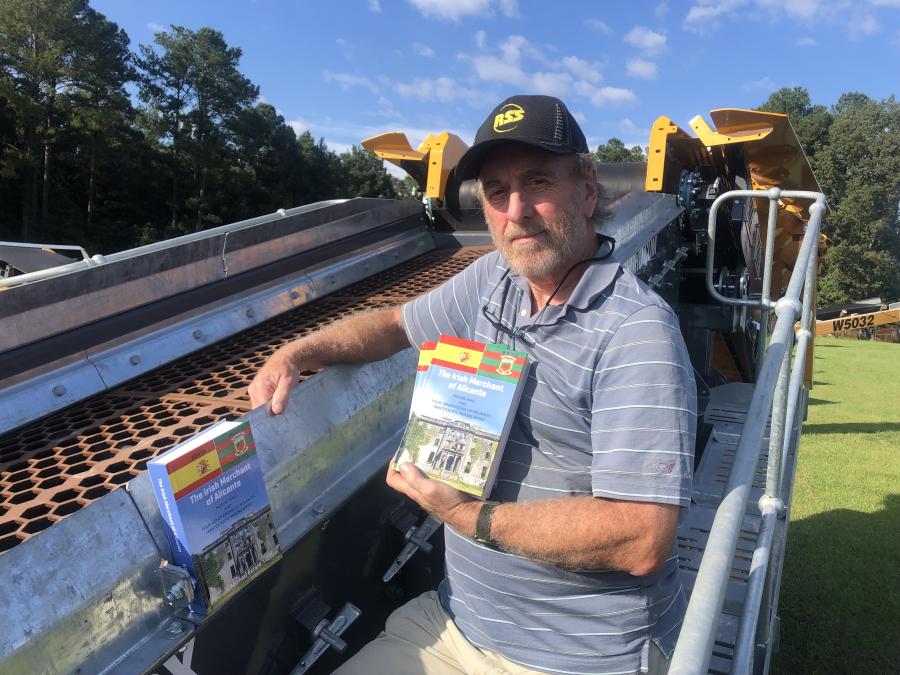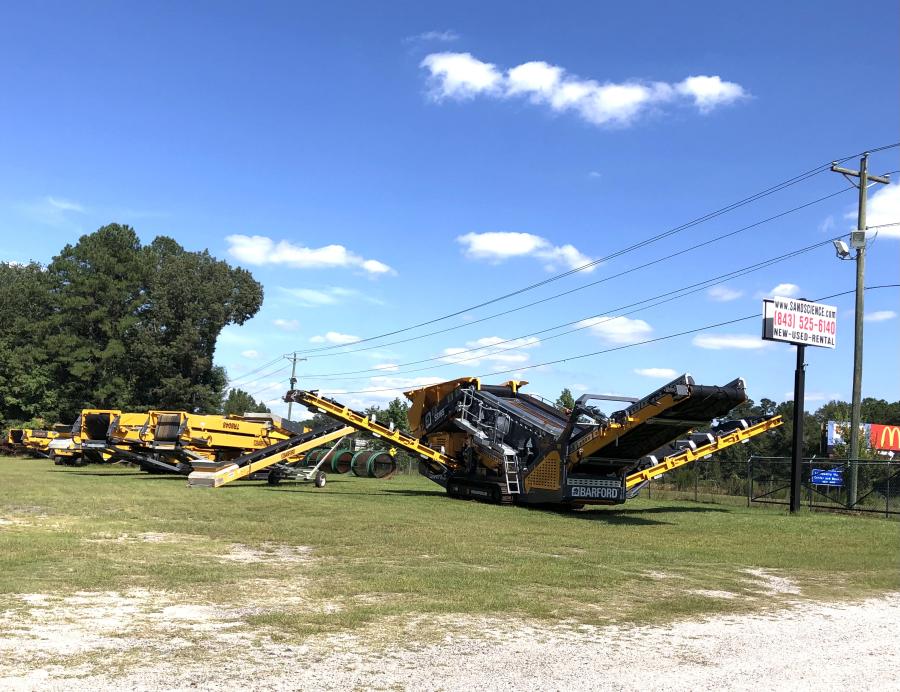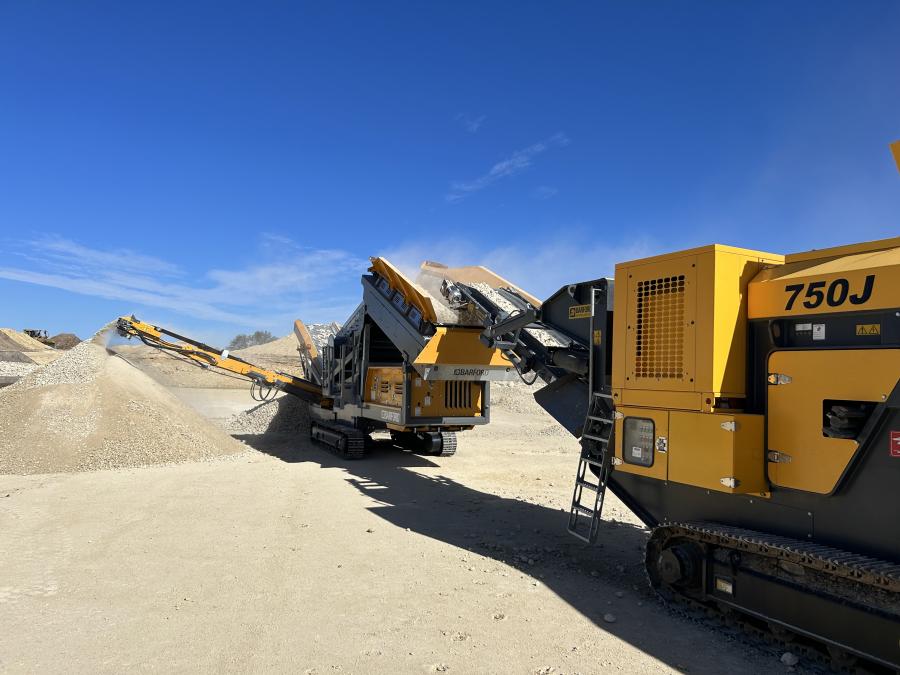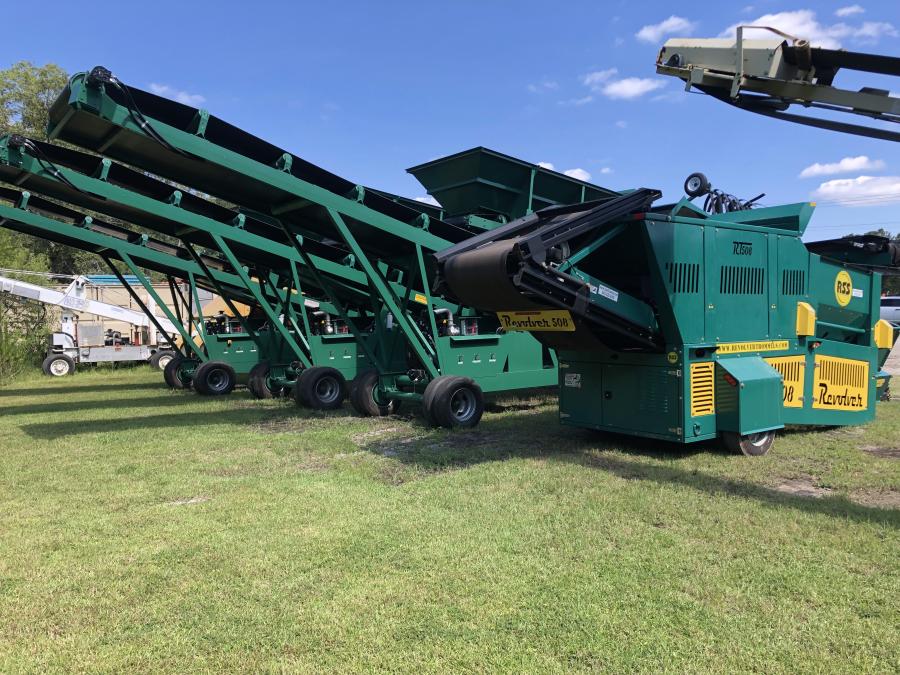Sand Science’s yard faces I-95, Exit 33, with various screeners and track stackers in
stock.
(Sand Science Inc. photo)
Gerry Kenny is personable in a very gregarious Irishman sort of way, but his aggregate processing equipment operation is no-nonsense and customer-centric. No blarney, in other words.
The Beaufort, S.C., dealership is called Sand Science Inc., a name purposefully chosen by Kenny to focus on his expertise rather than as an expression of allegiance toward one brand of machinery or another. The business is for contractors who need aggregate processing solutions, not just a piece of equipment.
"Problem-solving is the core of our business," said Kenny. "We can tailor the equipment to that end. It is fair to say that we are industry leaders for solving problems for our customers. We are very unique within the industry."
For 38 years, Kenny has successfully worked this business formula. His customers mostly are contractors of one kind or another. His product lineup includes screening, crushing, conveying and recycling equipment. Roto-Screen trommel screens are his biggest seller, with screens in general in constant demand.
When interviewed, Kenny had just returned from setting up a machine in the mountains of North Carolina. A repeat customer there needed a Revolver compact screening unit to help filter refuse from soil in an old dumping ground.
"We are doing an immense amount of work with customers who are finding that, as they develop a site, they run across a soils problem," he said. "This compact Revolver screen is very popular in environmental cleanup."
The North Carolina run was doubly beneficial for Sand Science: a rental contract with another repeat customer in the Tar Heel State was up, so Kenny was able to carry home that machine on the same run.
Sand Science is the national distributor for Roto-Screen trommel screening plants, which are "very popular and versatile machines with so many uses for contractors," he said.
Consequently, long-distance customers are not rare. Yet most of the company's business remains in the Southeast, from Florida north to mid-Virginia and Tennessee and as far west as Alabama. Other product lines include Barford conveyors and screens and Kafka conveyors and feeders.
"We are on Interstate 95 and thousands and thousands of potential customers drive past all the time," Kenny said of his Southeast customer base. "Contractors stop by and say, ‘I've been driving by this yard for 30 years and I never thought I would need a piece of your equipment.' That happens quite a lot. And we usually can solve their problem."
What Sand Science does not offer are excavators and wheel loaders and other types of industrial and construction machinery. That is not an oversight.
"Too many people in the industry try to sell everything," said Kenny. "A lot of existing customers and new customers come to us because they know we aren't going to try to talk them into buying an excavator. We stay within the field we know."
On the Sand Science lot in South Carolina are millions of dollars of aggregate processing machinery — positioned there for quick responses to customer needs, according to Kenny.
"We know the nature of the American customer. ‘I have a problem and I need it resolved now! Don't tell me I have to wait six weeks for a machine!'"
The spectrum of these demanding American customers ranges from fledgling company owners to 24-7 industrial executives. Kenny listed a broad variety of types of customers, including railroad car and barge loading contractors, as well as the many types of material they handle — millings, gypsum, pellets, recyclables and industrial sands, among them.
The career path Kenny traveled from his native Ireland to coastal South Carolina took a turn in the 1970s. It was then he began to work for the Irish manufacturer of Powerscreen equipment. He worked with that brand first in England and then on the Continent before moving with the company to South Africa and its large mining industry.
In 1984, when apartheid policies began to lose their grip in that African nation and tumultuous change was in the offing, Kenny and his wife decided it was time for another move. The Irish organization was setting up dealerships in the United States, a place the couple had long desired to live. Looking for a warm-weather state, the Kennys opted to start a dealership in South Carolina.
"Sand and gravel processing were the mainstay of the industry here," Kenny said.
So, to loosen his identification with any single brand, he opted to name his dealership Sand Science Inc. Some years later, he parted on good terms with Powerscreen. As foreseen, the generic name of the company transitioned easily to accommodate other manufacturers.
Renting equipment instead of buying it is a driving force in many industries today — including aggregate processing. Contractors digging, screening and crushing material encounter situations where investing in a machine is a bigger risk than they want to take at that moment. Big operators sometimes just need an interim piece of equipment, for example.
"Then, there are small operators, or seasonal ones, who can't afford a machine at the start, so they rent once or twice a year till they reach a point where they can afford to have one in their equipment yard," Kenny said.
Bottom line: Rental customers are an important segment of the company's revenue stream.
"We eventually sell a lot of equipment to people who start off renting. We don't try to take customers' money when they don't have it."
Rentals of the processing equipment can run from a couple of weeks to a couple of years. Kenny said keeping a solid lineup of equipment in his equipment yard is a key to rentals.
"For instance, we try to make sure we have some of our specialty transloading and rail unloading machines in stock. It's important for us to have it here ready to go."
After nearly four decades of experience with aggregate-handling equipment, the 68-year-old company owner is in a position to see industry trends. One trend is the increasing popularity of mobile machinery rather than fixed plants. While Kenny believes in mobility, he sees the shortcomings of self-propelled machinery on tracks, though he can offer such models to his customers.
"There is a tremendous need for mobile field machinery," he said, citing wheeled processing units that are easily moved from place to place — "machines like Roto-Screen has that you can pull into a site and be working in five minutes."
The more compact units he describes also are less likely to have engines subject to Tier IV and Tier V regulations and, therefore, are less susceptible to technological breakdowns.
"Five years ago, customers wanted fancier controls and more electronics. Now they don't want the bigger machines so much. They want to keep it simple."
Through the years, Kenny also has witnessed a "very haphazard" marketplace for recycling equipment, as public recycling campaigns and buyers of recycled materials come and go. "It's a very complicated situation overall for the recycling industry."
What is proving a boon for dealers of recycling machinery is the movement to utilize urban land previously passed over because it was boggy or rife with roots or formerly was the site of a dump.
"They can get one of our screens in there and repurpose a site by environmentally cleaning it. That part of recycling is very much growing."
Sand Science Inc. is very much a family company now. Sons Eoin and Adam Kenny are fully involved in managing and operating the firm alongside their father. The senior Kenny believes that having the three Kennys as the face of the business makes doing business with Sand Science a more satisfying experience for customers.
"When you come in here, you're dealing with the owners of the business, me and my sons," he said. "And we're dealing directly with the people who make the machines. So, when a contractor comes in and says to one of us, ‘I have a need for this or that machine,' we can tell him straight up, ‘We can do that. We can make it happen.' The customer knows very quickly he is dealing with a principal in the company."
The company founder is cautious of talking too much about the future of the company. However, with Sand Science Inc. now a national distributor with customers across the country, a second U.S. location farther west makes sense.
"Yes, I foresee that happening," Kenny said of the company's eventual expansion. "We have talked about it. The pandemic threw everyone's plans aside, but in recent years we've talked about it a lot. It's on our agenda. We're keeping our eyes on it." CEG
Writing the Great Irish American Novel

Writing under the pen name of Michael Gerard (which actually are his first and middle names), his latest novel is The Irish Merchant of Alicante. It tells the story of four generations of the Moore family, who were landlords in Ireland beginning in the middle of the 17th century. They were gentry who nevertheless began to sympathize with the tribulations of tenant farmers and the many Irish people restive under English rule.
The Irish eventually won their independence and their freedom from the landlord system, of course, but the Moore family was not on the losing side. Kenny's book is a sympathetic look at the struggle from the eyes of the progressive overlords.
"The Moores were a rare breed among landlords," he said. "They were Catholic and very nationalist. They were more Irish than the Irish themselves."
He cited the example of one member of the Moore family who raised racing horses and won a prestigious race in England in 1846. Rather than pocket the winning money, he spent it on a shipload of grain to help feed starving Irish during the country's famine. "The Moores were the best of the landlords. There were plenty of bad ones."
Kenny said the strength of his historical novel is the history, though both history and storytelling are cited by reviewers of the book. Would female book-readers find his latest book interesting?
"Absolutely," said the author. "There are two very strong female characters in it. I've had lots of interesting feedback from women who read it."
Kenny got started writing books on a dare. Because Irish writers are well-known — Oscar Wilde, Samuel Beckett, James Joyce, Maeve Binchy, to mention a few — a friend dared Kenny to write one, too. He responded in 1997 by penning The Kimberly File, a tale about intrigue in the diamond-mining industry in South Africa, where Kenny once had lived and worked.
Because his father had been one of many "unsung heroes" in the final years of Ireland's fight for independence, Kenny had long wanted to write about him and his peers in the fight. He vowed to next write that fictionalized history book, did so, and published it in 2021, the 100th anniversary of independent Ireland. Title: Ireland's Final Rebellion — 1919-1921.
The book actually was the first of a two-part publishing effort. He combined it with An American Dream, which followed an Irishman's travel to the New World. "The first part is about my father's history and the second part is about me. I remember my father regretting he hadn't emigrated to America. That sort of cemented the idea in my head of moving here."
The third book came about after a family member drove Kenny to a ruined mansion in County Mayo while he was on a trip back to Ireland five years ago. The structure dates from the 1790s and had belonged to the Moore family. That trip sparked Kenny's research for and writing of the latest novel.
As a former cement plant worker and aggregate equipment business owner, Kenny admired how firmly the 230-year-old building still stood. "George Moore was particular in using quality Irish limestone from a local quarry in building that house. The structure still is solid as a rock."
His hope is that the book on the Moores might spark a movement to restore the impressive structure, which is featured on the cover of the novel. "That will be my reward."
Does Kenny, writing as Michael Gerard, have another book in him? Yes, he said. He is looking for other Irish American connections to write about in future books. "There are a lot of Irish Americans who haven't gotten their 15 minutes of fame."
Michael Gerard novels are available from Amazon. More information about the books and the author is available at his website, https://www.michaelgerardauthor.com.
This story also appears on Aggregate Equipment Guide.
Today's top stories



















